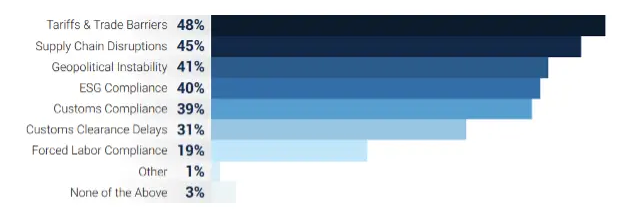Descartes Systems Group has released the findings from its survey, which examined the most significant global trade challenges facing logistics and supply chain leaders today.
The 2024 Supply Chain Intelligence Report: Escalating Challenges for Global Supply Chain Leaders study showed that 48% of respondents identified rising tariffs and trade barriers as their top concern, closely followed by supply chain disruptions at 45% and geopolitical instability at 41%. Moreover, tariffs and trade barriers ranked as the priority issue regardless of company size, as respondents at companies with less than 250 employees, 251-500, 501-1,000, 1,001-50,000 and 50,000+ employees all cited it as the most significant issue they are currently facing.
Key takeaways
- 62% of respondents expect large-scale supply chain disruptions to become more frequent.
- 48% rank rising tariffs and trade barriers as their top international trade challenge.
- 41% cite geopolitical instability as a major concern for their operations.
- 40% identify ESG compliance as a critical priority for long-term growth in global trade.
These challenges and others highlight the need among organizations involved in international trade to sharpen their supply chain analytics practices to help build more resilient supply chain networks, including having robust, technology-enabled insights to keep pace with frequent and complex tariff updates, quickly find new markets, secure better sources of supply and acquire timely and high quality competitive intelligence.

Evolving tariffs and trade policies are one of a number of complex issues requiring organizations to build more resilience into their supply chains through compliance, technology and strategic planning,
… said Jackson Wood, Director, Industry Strategy at Descartes.
Furthermore, the survey highlights the importance of trade and supply chain intelligence to:
- Keep pace with tariff updates
- Identify quickly trouble spots in their supply chains
- Formulate timely risk mitigation plans
- Follow trade and other compliance regulations
Results also showed that the impact of top global trade challenges on organizations can potentially vary by factors other than company size, including business growth, country and industry. For example, tariffs and trade barriers were more concerning for companies expecting greater than 15% growth (51%) than for those companies with shrinking/limited to no growth (43%).



























































